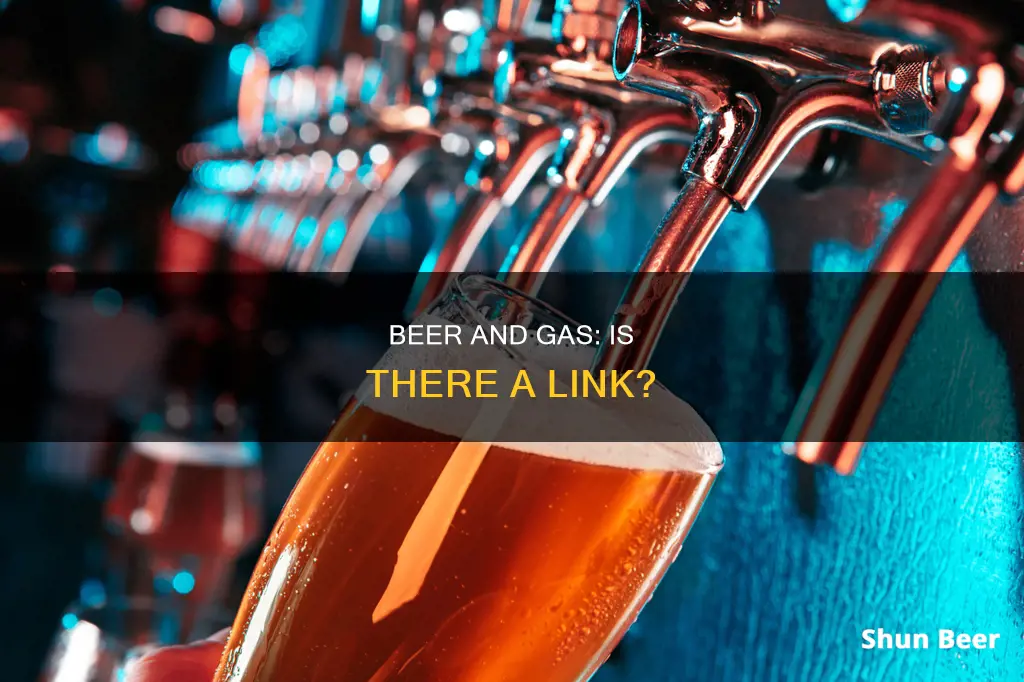
Beer is a carbonated beverage that contains yeast, and drinking it can lead to bloating and flatulence. Beer releases carbon dioxide gas, which can build up in the gut, causing bloating and excess gas. Additionally, beer consumption can cause yeast overgrowth in the intestinal tract, leading to increased gas production. Beer is also known to contain sulfate, which can make flatulence smellier due to the presence of sulfur-containing chemicals. For these reasons, beer is often associated with increased gas and digestive issues, commonly referred to as beer farts.
| Characteristics | Values |
|---|---|
| Cause of gas | Beer releases carbon dioxide gas which builds up in the gut. |
| Why it is gassy | Beer contains sulfate, which makes farts smellier. |
| Other effects | Beer can worsen ulcers and aggravate acid reflux. |
| How to prevent gas | Take Beano before drinking beer. |
What You'll Learn

Beer releases carbon dioxide gas, which builds up in the gut
The release of carbon dioxide is not the only reason beer causes gas. Beer also contains sulphate, which is broken down into hydrogen sulphide by the bacteria in our gut, and this is what gives farts their distinctive smell. The more complex the beer, the more likely it is to cause flatulence, as these beers contain more complex sugars and live yeast that bind with those sugars, which the digestive system struggles to process.
Beer is not the only drink that can cause bloating and gas. Carbonated drinks, such as soda and seltzer, can also cause gas as the carbonation comes from gas blended with water. Even diet sodas are no better, as they contain artificial sugars that are not completely absorbed in the digestive system, leading to fermentation and gas production in the intestines.
Alcoholic drinks can also cause bloating due to their calorie density. Beer, wine, whiskey and other spirits are high in calories, and frequent drinking can lead to weight gain. Alcohol is also an inflammatory substance, causing swelling in the body, particularly in the gastrointestinal tract, which can result in gas and bloating.
If you want to avoid bloating and gas, it's best to stay away from beer and other carbonated drinks. Drinking water before, during and after consuming these beverages can also help prevent their inflammatory effects on the body.
Beer and Lifting Weights: A Healthy Balance?
You may want to see also

Beer contains yeast, which can result in bloating
Beer is well known for causing bloating, and there are several reasons why this might be the case. Firstly, beer releases carbon dioxide gas, which can build up in the gut, causing bloating and excess gas. Beer is also carbonated, and the carbonation releases air pockets of carbon dioxide gas into the body, which can lead to abdominal distension and increased bloating.
Another reason beer might cause bloating is due to the presence of yeast. Yeast is a common ingredient in beer, and it can result in yeast overgrowth in the intestinal tract, leading to bloating and flatulence. Heavy or complex beers with more live yeast and complex sugars are more likely to cause flatulence as they are more challenging for the digestive system to process.
In addition to the gas-producing effects of carbonation and yeast, beer also contains calories and can contribute to weight gain, which can also lead to a bloated appearance. Beer is calorie-dense, with a regular beer containing around 153 calories per 12 fluid ounces.
Finally, alcohol in general, including beer, can cause irritation and inflammation in the stomach and digestive tract, which can result in bloating. This inflammation can be made worse by mixers such as sugary and carbonated liquids, leading to further gas, discomfort, and bloating.
Vegan Beer Drinking: What UK Vegans Need to Know
You may want to see also

Beer can cause weight gain, which may feel like bloating
Beer is a carbonated beverage, which means it contains carbon dioxide gas. When we drink beer, this gas is released and builds up in the gut, leading to bloating and flatulence. Beer is also high in calories, and regular consumption can lead to weight gain, which may also feel like bloating.
Beer contains complex sugars and live yeast, which bind together in the intestinal tract. This yeast overgrowth can cause bloating and excess gas. The digestive system struggles to digest these complex sugars and yeast, leading to the production of smelly wind.
The calories in beer can contribute to weight gain, especially when consumed in large quantities. Alcoholic drinks are typically high in calories, and beer is no exception. A regular beer weighing 12 fluid ounces contains approximately 153 calories. The high calorie content of beer can lead to weight gain, which may be mistaken for bloating.
In addition to the gas-producing and calorie-rich properties of beer, it is also a diuretic, which means it can lead to dehydration. When the body is dehydrated, it tries to retain as much water as possible, leading to fluid retention and a feeling of bloating.
Lifestyle changes, such as reducing alcohol intake, maintaining a balanced diet, and regular exercise, can help manage bloating and weight gain associated with beer consumption.
Beer Cans: Safe Drinking Vessels?
You may want to see also

Beer can lead to gastritis, an inflammatory condition that affects the stomach
The symptoms of gastritis include a gnawing, burning ache in the stomach, constant pain between the navel and ribs, belching and hiccupping, and a bloated or full feeling in the stomach that worsens after eating. If left untreated, gastritis can lead to serious problems such as anemia, peptic ulcers, gastric polyps, and stomach tumors.
Beer, in particular, has been associated with a "beer belly" or abdominal bloating. This is because beer, like carbonated beverages, releases carbon dioxide gas into the body, which leads to increased bloating and a heavy feeling in the stomach. Additionally, the high calorie and sugar content in beer can contribute to weight gain, further exacerbating the bloated appearance.
To prevent or reduce alcohol-related bloating, it is recommended to limit alcohol consumption to no more than one drink per day for females and two drinks per day for males. Drinking water before, during, and after consuming alcohol can also help prevent its inflammatory effects.
If you are experiencing stomach pain or other symptoms of gastritis, it is important to consult a doctor for a proper diagnosis and treatment plan.
Old Beer: Is It Safe to Drink After Four Months?
You may want to see also

Beer can worsen ulcers and aggravate acid reflux
Beer can have more serious health effects than just a temporary case of flatulence. Beer consumption can worsen ulcers and aggravate acid reflux, which can be very painful and uncomfortable.
Ulcers are sores in the lining of the stomach or intestine and can be caused by an excess of stomach acid. Beer increases the risk of developing ulcers by raising acid levels in the stomach. Alcohol consumption can also lead to gastritis, an inflammatory condition that affects the stomach lining. This condition can be erosive, allowing stomach acid to damage the stomach lining and cause peptic ulcers.
Acid reflux is a condition in which stomach acid flows back into the oesophagus, causing heartburn and an unpleasant taste in the mouth. Beer can aggravate acid reflux by increasing stomach acid levels and causing yeast overgrowth in the intestinal tract.
In addition to worsening ulcers and acid reflux, beer can also cause bloating and weight gain, which may further aggravate these conditions. Beer is carbonated, releasing carbon dioxide gas into the body, which can lead to increased bloating and a feeling of heaviness. Beer is also relatively high in calories, with a regular beer containing 153 calories per 12 fluid ounces. This can contribute to weight gain, which can put pressure on the stomach and intestines, making ulcers and acid reflux more painful.
Therefore, while beer may be enjoyable for some, it is important to be aware of its potential negative effects on digestive health. For those with existing intestine-related diseases or disorders, beer can worsen symptoms and cause additional complications. It is always a good idea to consult with a doctor or healthcare professional if you have any concerns about your health or the effects of beer consumption.
Flooded Beer Font: How Does It Work?
You may want to see also
Frequently asked questions
Beer releases carbon dioxide gas, which builds up in the gut, causing bloating and excess gas. Beer also causes yeast overgrowth in the intestinal tract, which leads to flatulence.
Drinking beer can lead to inflammation in the gut and, after consistent drinking, can increase the risk of liver disease. Beer can also worsen ulcers and aggravate acid reflux.
There are a few things that may help reduce gas when drinking beer. These include drinking water before, during, and after drinking beer, eating and drinking slowly, and avoiding carbonated drinks, gum, and hard candy.
Yes, cider, wine, or water are some alternatives that may be better tolerated by people who are sensitive to beer.







